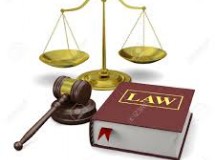ARREST An "arrest" in strict legal terms occurs when a person has been placed under police custody and no long feels they have the freedom to move around or leave the area.
An arrest occurs when you are under the authority of the officer.
Therefore, an arrest has occurred if you are handcuffed or if you are placed in the back of the police car; but it also could have occurred without the use of any physical restraints at all.
If the officer tells you that you are under arrest and at that moment you feel you cannot leave the area, legally speaking, you are in fact under arrest, even without those restraints.
Once the police officer pulls you over he can arrest you if he actually observed you committing a crime, if he has probable cause to believe that you committed a crime or if he has a warrant for your arrest.
Officers will pull over drivers on suspicion of DUI/DWI when they observe that person driving erratically, but these arrests also occur when an officer pulls people over for speeding, expired registration tags, broken headlights/taillights.
Some arrests occur after unfortunate accidents or at sobriety roadblocks or check points.
Once the officer has pulled you over, he will often administer a breathalyzer test or have you conduct some "field sobriety tests.
" If you blow a.
08% blood alcohol level or above, most state laws consider this result sufficient cause for arrest.
If you blow below a.
08% blood alcohol level you may still be arrested if the officer suspects that you are so under the influence that your ability to drive is impaired.
(If the officers do not have breathalyzers, they may issue a test via urine or blood sample once they take you to the police station for booking.
) Some officers are not equipped with breathalyzers and conduct a variety of "field sobriety tests" that they have been trained to administer.
These tests include things like walking a straight line or standing on one foot.
These tests are not designed to humiliate you, but to determine whether you are fit to drive.
If you think that your arrest was not properly conducted, it could be that the procedure was done unlawfully.
BOOKING Once you have been arrested on suspicion of DUI or DWI the officer will take you to a central location where you will be "booked.
" Booking is an administrative process during which the police officer will record specific information and perform other administrative tasks.
These administrative tasks include:
As a requirement of your release you must promise to appear for all scheduled court proceedings; this includes your arraignment, preliminary hearing, pre-trial motions and the trial.
Bail may be available immediately after booking.
If not, it will be up to a judge or magistrate to decide whether to allow the suspect to be released on bail.
The amount of the bail payment can be a set amount or it could be based on the suspect's past criminal record (and prior DUI/DWI offenses), the seriousness of the suspect's offense in this instance (are there any injuries? property damage?), or even the suspect's ties to the community (i.
e.
family, employment, community).
If you or your family cannot afford the bail payment you can contact a bail bond agency which will post a bond on behalf of the individual with the promise that the entire amount will be paid should you (the suspect) fail to appear as you promised.
The bond agency will charge a fee for this service, usually around 10% of the bail amount.
Sometimes a judge will decide to release a suspect on their "own recognizance," without the need for any bail payments, but with some restrictions attached.
Such restrictions would include an order to remain in the area while the case is proceeding.
The judge will consider the factors listed above to make this determination.
If you are released on your own recognizance and do not appear at your court dates you can be arrested immediately.
A word to the wise - attend ALL your court dates.
An arrest occurs when you are under the authority of the officer.
Therefore, an arrest has occurred if you are handcuffed or if you are placed in the back of the police car; but it also could have occurred without the use of any physical restraints at all.
If the officer tells you that you are under arrest and at that moment you feel you cannot leave the area, legally speaking, you are in fact under arrest, even without those restraints.
Once the police officer pulls you over he can arrest you if he actually observed you committing a crime, if he has probable cause to believe that you committed a crime or if he has a warrant for your arrest.
Officers will pull over drivers on suspicion of DUI/DWI when they observe that person driving erratically, but these arrests also occur when an officer pulls people over for speeding, expired registration tags, broken headlights/taillights.
Some arrests occur after unfortunate accidents or at sobriety roadblocks or check points.
Once the officer has pulled you over, he will often administer a breathalyzer test or have you conduct some "field sobriety tests.
" If you blow a.
08% blood alcohol level or above, most state laws consider this result sufficient cause for arrest.
If you blow below a.
08% blood alcohol level you may still be arrested if the officer suspects that you are so under the influence that your ability to drive is impaired.
(If the officers do not have breathalyzers, they may issue a test via urine or blood sample once they take you to the police station for booking.
) Some officers are not equipped with breathalyzers and conduct a variety of "field sobriety tests" that they have been trained to administer.
These tests include things like walking a straight line or standing on one foot.
These tests are not designed to humiliate you, but to determine whether you are fit to drive.
If you think that your arrest was not properly conducted, it could be that the procedure was done unlawfully.
BOOKING Once you have been arrested on suspicion of DUI or DWI the officer will take you to a central location where you will be "booked.
" Booking is an administrative process during which the police officer will record specific information and perform other administrative tasks.
These administrative tasks include:
- Recording the suspect's personal information
- Recording the facts and circumstances of the suspect's alleged crime
- Searching for and records any information on the suspect's possible past criminal activities
- Photographing and fingerprinting the suspect
- Searching the suspect, confiscating any personal property (i.
e.
wallets, purses, jewelry, keys, etc.
) and inventorying it for return upon the suspect's release - Placing suspect in holding cell at the police station or in a local jail where they will be held unless they are released on bail
As a requirement of your release you must promise to appear for all scheduled court proceedings; this includes your arraignment, preliminary hearing, pre-trial motions and the trial.
Bail may be available immediately after booking.
If not, it will be up to a judge or magistrate to decide whether to allow the suspect to be released on bail.
The amount of the bail payment can be a set amount or it could be based on the suspect's past criminal record (and prior DUI/DWI offenses), the seriousness of the suspect's offense in this instance (are there any injuries? property damage?), or even the suspect's ties to the community (i.
e.
family, employment, community).
If you or your family cannot afford the bail payment you can contact a bail bond agency which will post a bond on behalf of the individual with the promise that the entire amount will be paid should you (the suspect) fail to appear as you promised.
The bond agency will charge a fee for this service, usually around 10% of the bail amount.
Sometimes a judge will decide to release a suspect on their "own recognizance," without the need for any bail payments, but with some restrictions attached.
Such restrictions would include an order to remain in the area while the case is proceeding.
The judge will consider the factors listed above to make this determination.
If you are released on your own recognizance and do not appear at your court dates you can be arrested immediately.
A word to the wise - attend ALL your court dates.
SHARE








































